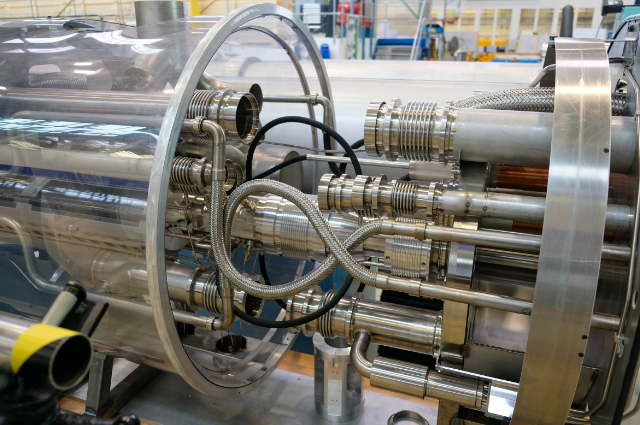
Photo by Brandon Style on Unsplash/ Representative Image
India has taken a monumental step forward in the dominion of quantum technology and has successfully demonstrated quantum entanglement-based free-space secure communication over an impressive distance of more than one kilometre. This groundbreaking achievement, a collaborative effort between the Defence Research and Development Organisation (DRDO)-Industry-Academia Centre of Excellence (DIA-CoE) and IIT Delhi, marks the dawn of a new quantum era for the nation. It represents a significant stride in securing our digital future and positioning India at the forefront of advanced communication technologies.
A Real-world breakthrough, not just a simulation
What makes this achievement particularly remarkable is its execution in real-world conditions not merely a laboratory simulation. The experiment successfully established a secure key rate of 240 bits per second with an impressively low error rate. This demonstrates the practical feasibility and robustness of quantum communication by proving it can operate effectively alongside existing traditional data transmission methods. This isn't just theoretical progress; it's a tangible demonstration of quantum technology's potential for immediate application.
Paving the way for quantum Cyber Security and beyond
This successful demonstration of entanglement-assisted quantum secure communication is a critical precursor for a multitude of real-time applications in the field of quantum cybersecurity. As highlighted by the Ministry of Defence, this breakthrough will significantly accelerate the development of long-distance Quantum Key Distribution (QKD), a highly secure method for exchanging cryptographic keys. Beyond QKD, this advancement lays the groundwork for the creation of sophisticated quantum networks and ultimately, the realization of a future quantum internet. These advancements promise an unprecedented level of security for sensitive information by safeguarding it against even the most advanced cyber threats.
Rise of Quantum Security
Quantum security is a rapidly evolving field that aims to develop and implement algorithms and protocols that can withstand the advanced computational power of quantum computers. This field is crucial in ensuring the long-term security of digital communications, as quantum computers become increasingly powerful and prevalent. By developing quantum-resistant algorithms, cybersecurity experts can future-proof digital infrastructure against potential quantum threats.
Institutions like the National Institute of Standards and Technology (NIST) are at the forefront of the quantum security movement. NIST advocates for a proactive approach to cybersecurity, one that prioritizes the development of quantum-resistant algorithms and protocols. By doing so, NIST seeks to ensure a resilient cybersecurity infrastructure capable of withstanding the advanced computational power of quantum technology.
"Game Changer" for Future Warfare
The strategic importance of this achievement has been widely recognized. Union Defence Minister Rajnath Singh extended his congratulations to DRDO and IIT-Delhi, emphasizing that this development showcases India's rapid progress in a field that will be a "game changer in future warfare." The ability to conduct secure, unhackable communication will provide a significant strategic advantage by boosting national security and defence capabilities in an increasingly complex global landscape.
Collaborative excellence behind the innovation
This significant milestone is the result of dedicated research and development, specifically under the project titled ‘Design and development of photonic technologies for free space QKD.' This crucial project was sanctioned by the Directorate of Futuristic Technology Management (DFTM), DRDO, underscoring the organization's commitment to fostering cutting-edge technological advancements. The successful demonstration itself was founded by Professor Bhaskar Kanseri's research team, whose expertise and tireless efforts brought this vision to completion. This collaborative model will bring together government, industry, and academia, which is a testament to India's growing innovation ecosystem.
Rise towards the futuristic security & free-space Quantum Communication
In a transformative step toward ultra-secure communication, Free-Space Quantum Key Distribution (QKD) is revolutionizing how sensitive information can be exchanged without relying on traditional infrastructure. Unlike conventional optical fibre networks, which require extensive groundwork and are often costly and disruptive, especially in rugged terrains or densely populated city areas where free-space QKD offers a wireless alternative. This innovative method uses quantum principles to transmit data through open air or space, effectively bypassing the need for physical cables.
Building on groundbreaking milestones in Quantum Communication
India’s foray into quantum communication began gaining momentum with a significant achievement in 2022. A pioneering intercity quantum link between Vindhyachal and Prayagraj was successfully demonstrated by scientists from the Defence Research and Development Organisation (DRDO) by working in collaboration with Professor Bhaskar’s team. This experiment used commercial-grade underground dark optical fibre to securely transfer quantum keys over a considerable distance.
The following year saw yet another milestone. The same team, backed by DRDO, managed to distribute quantum keys using entangled photons over a 100-kilometre coil of telecom-grade optical fibre. These breakthroughs mark crucial steps in the development of tamper-proof communication channels that are resilient against cyber threats and espionage.
Collaboration among DRDO, Academia and Industry
These innovations are not occurring in isolation. They are being cultivated within a broader ecosystem led by DRDO’s collaborative initiative called the DRDO-Industry-Academia Centres of Excellence (DIA-CoEs). Under this initiative, 15 centres have been set up in leading institutions like the Indian Institutes of Technology (IITs), the Indian Institute of Science (IISc), and prominent universities across the country. These centres are dedicated to advancing next-generation defence technologies with quantum communication being one of the flagship areas of focus.
Recognizing the strategic value of this advancement, Defence Minister Rajnath Singh extended his congratulations to both DRDO and IIT Delhi for reaching this technological milestone. He emphasized that India has now officially stepped into a new quantum era of secure communication where development is about to become a decisive factor like future warfare. With global threats evolving rapidly, such advancements could provide India with a critical edge in safeguarding national security.
. . .
References:
